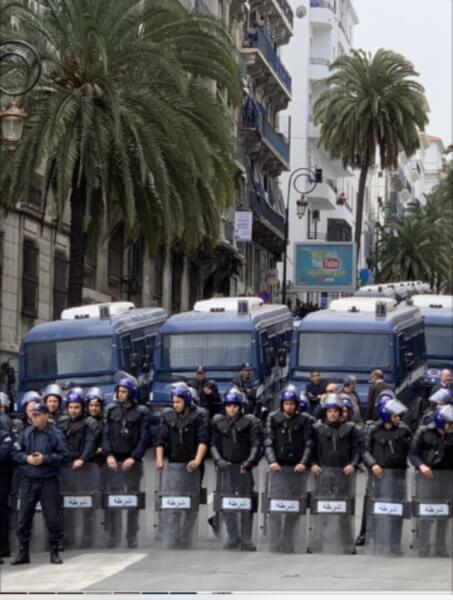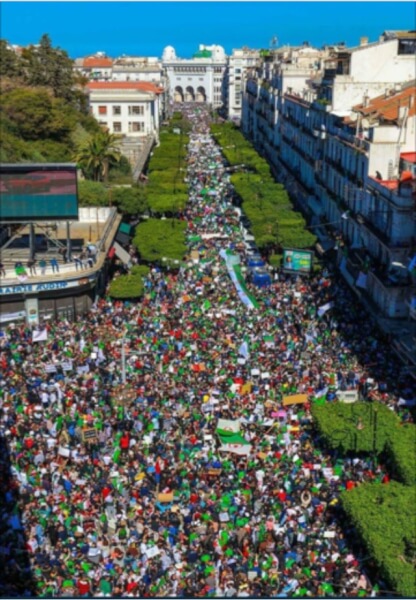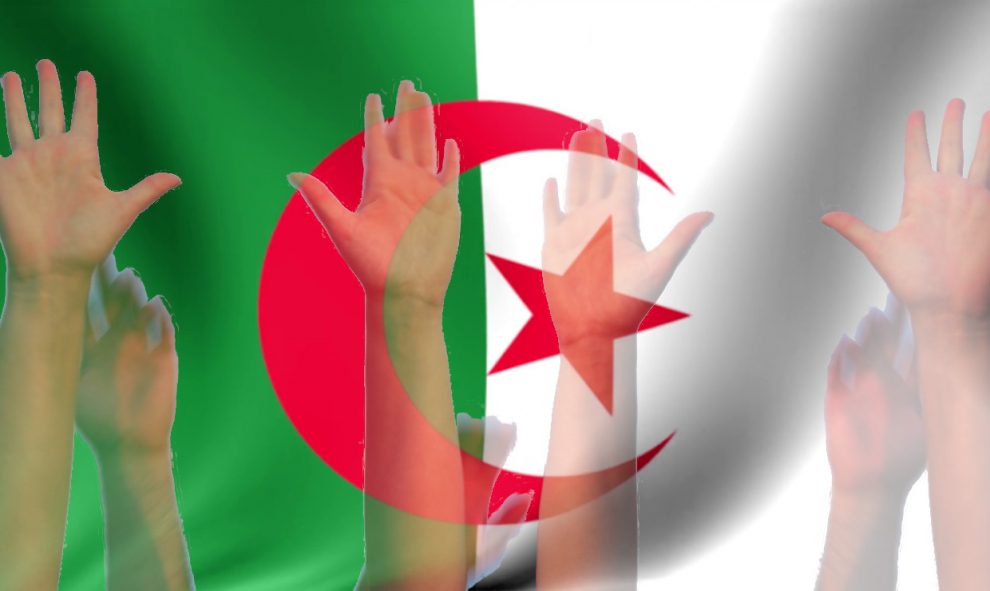People are more accustomed to the experience of political hopes frustrated than of hopes fulfilled, they bear a crown of disappointment which weighs heavily on them all.
The recent events that have been shaken Algeria’s regime have shaped a protest movement that its members are calling the “Smile’s Uprising” because of its festive mood and humorous slogans. So far, however, it looks like a mosaic one instead. The regime is slowly pulling back to avoid a clash, and worse, to crash the protest movement, whereas the latter is insisting to go forward, enjoying the peaceful rallies and the popular trajectory.
Thus the questions that analysts who focus in particular on the Islamist movement in Algeria have been asking: where are the Islamists? What are they saying? Or has the Feb. 22nd uprising imploded the entire conventional arts of politics, including the Islamists?
Yet the spectrum of political Islam in Algeria is still haunting the liberal civil society, the corporatist feminist activists, and “republicans’” wing of the regime at large. Even though the Islamist leaders, notably al-Ikhouan (Ikwan, Brothers) are in a deep political crisis who have gone from political and societal reality to dialectical political crisis identity.
To answer all these questions, does Algerian exceptionalism really exist in politics? Following the ongoing protest movement, the answer is yes. Despite the absence of explicit Islamist slogans like those of the 1991 protests, i.e,: “Islam is the solution,” “Neither East nor West,” “Islamia, Islamia.” Nonetheless, there were some pro-President Erdoğan slogans like: “We want a leader like him.” Also some quotes from the Islamists’ and elite’s chosen maître à penser, Prof. Malek Bennabi, and another slogan that caught my attention, “Neither East nor West, but Novemberian.” (In reference to November, 54 Communiqué).

Algerian anti-riot forces in Algiers Courtesy Khaled Drarni
One notices a large majority of the female protesters are wearing an Islamic head scarf (Khemar). This doesn’t mean they are for an Islamic Republic or in full commitment to the Islamist project. The Islamistsʼ establishment on the other hand, has been trying to capitalize on the ex-FIS reservoir electorate for almost decades without realizing their political tactics have failed them. Despite their charm to appear like the ex-FIS of 1990-1991, whose credibility was seen by majority of Algerians as based on the dynamic of regime change and rejection.
This dynamic is embodied in the person of Sheïkh Ali Belhadj, former co-head of the ex-FIS Party, who has been a vocal critic of the regime. Days before the uprising, he was abruptly arrested by the State Intelligence services while in his neighborhood and in front of a passerby and his son. “He is consequently getting some sympathy from some parts of the deprived youth as an equal victim of the system,” Dr. Amel Boubekeur Sociologist at Grenoble University told ADN.
Were three decades enough for the ex-FIS lieutenants to review their political strategy in terms of governing style and model? In this stance, one could draw a historical parallel with al-Hudaïbiyah’s Treaty, a ten-year truce between the Prophet Muhammad and the Quraïsh establishment in Mecca and its neighboring tribes. An existential treaty that was pivotal for the Muslim Califs who succeeded the Prophet Muhammad as a political leader and who ruled through all the Islamic dynasties that followed. In the same year the Prophet Muhammad and his companions marched peacefully unarmed towards Mecca.
However, despite their attempted charm, the current legalist Islamist parties have been sliced like cheesecake by the regime between loyal and opposed to the President’s policies for two decades without realizing their political tactics have failed the them.

Rally in Algiers, March 15. Courtesy L’EL-Biaroise Houra
To better understand the rise and fall of the legal Islamists in Algeria, one has to trace the period roughly from the October 5, 1988 Revolt to the emergence of the peaceful Uprising of February 22, 2019. During that period violent popular riots and internal divisions within the regime resulted in eliminating a part of the regime clan and the FLN party’s apparatchik. It further encouraged the reformists’ elite to emerge and lead dream-team governments under Premier Kasdi Merbah and later Premier Mouloud Hamrouche.
Similar to ongoing wrestling match between the regime’s strong men, unlike 2019, an organized opposition emerged from a pluralist legal frame and gave the ex-FIS an appearance that was more than a conventional political party with a critical vocal tone towards the regime and a solid electoral base. Thus a federation formed comprised mostly of trending Algerian Islamist factions that had gradually been structured in the ʻ80s in universities and national public assembling & distribution companies, with the exception of current Algerian Brothers who did not adhere to the ex-FIS because of disagreement based on egos and clear political vision.
In June 1990, the ex-FIS successively won the Municipal and Departmental elections defeating in a landslide victory the ruling FLN party and the secular opposition parties, FFS and RCD alike. Thus the relation between the ex-FIS leaders and the regime was tense and gradually deteriorated as the regime excelled later to divide and radicalize further the ex-FIS ideologue leaders and militants.
In 2012, the Islamist leaders formed an Islamist coalition called “Green Alliance” and participated in the 2012 Parliamentarian elections. The coalition suffered humiliating losses, gaining only 6.22% of the popular vote and 49 seats. In 2014, the MSP Party boycotted the Presidential election. Currently, the Algerian Brothers have been attempting to imitate the AKParti in Turkey (the Justice & Development Party) which has changed Turkeyʼs political microcosm. A faulty strategy, they could have looked to its western neighbor’s Justice & Development Party, to the Moroccan Islamists’ experience with the Palace.
The Algerian Islamists are still under the shock & awe of the ʻ90s military and Intelligence operations and their societal repercussions on the Algerian voters as whole, and the Islamists in particular. Today, the Islamists are politically in total disarray and unable to fill a classroom in a partisan political meeting. The conventional Islamist parties have initiated a political tactic that burned their cards because in the eyes of the population they were opportunists and incompetent like any other political parties.
The Islamists in Algeria paid a heavy price because of the regime demonization campaign against the terror of the Army groups, in a complex paradigm established by the Algerian regime: eradication and containment, President Bouteflika who offered pardon to the radical Islamists and the ex-FIS army branch (AIS) members, was the answer to contain the Islamists, making a new generation born in Algeria know more about FaceBook than the ex-FISʼ Book.
The Algerian regime infiltrated and filtrated all the Islamist parties from the MSP, a-Nahdha, and the micro-party Justice & Equity led by Ms. Salhi, whose party’s message seems to be lost in action to Dr. Amar Ghoul who is explicitly and actively involved with the Presidentʼs “alliance” and policies — to many observers his political party is the last tactical move of the Presidentʼs entourage and Intelligence in their hidden combat against the Islamists in Algeria to bury them smoothly, driving the final nail in the coffin. Dr. Ghoul is a former MSP and a Nahnahist and creator of the sixth Islamist party called TAJ (Rally of Algeriaʼs Hope).
At the end of the day, people are more accustomed to the experience of political hopes frustrated than of hopes fulfilled, they bear a crown of disappointment which weighs heavily on them all.
Source: thearabdailynews







Add Comment